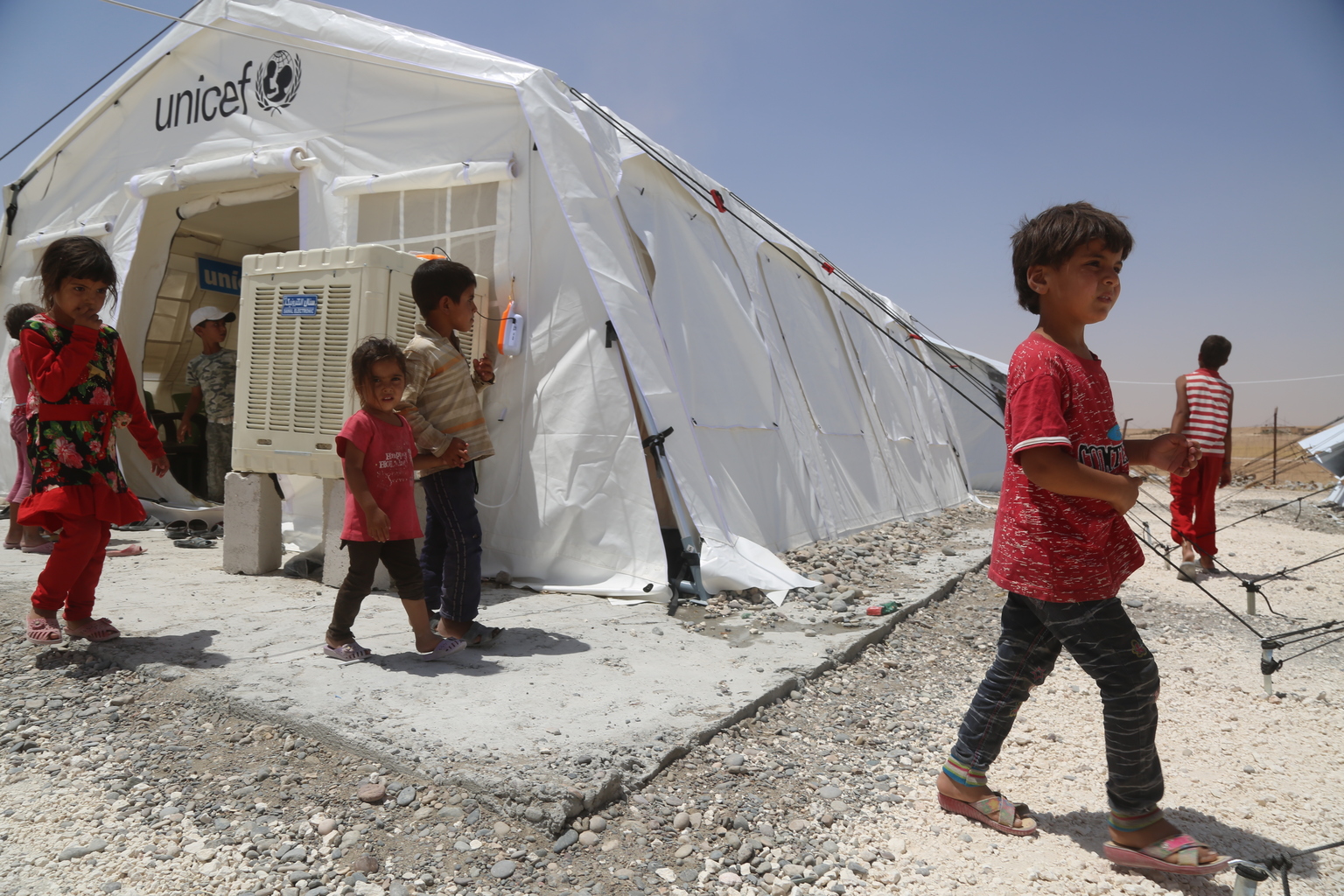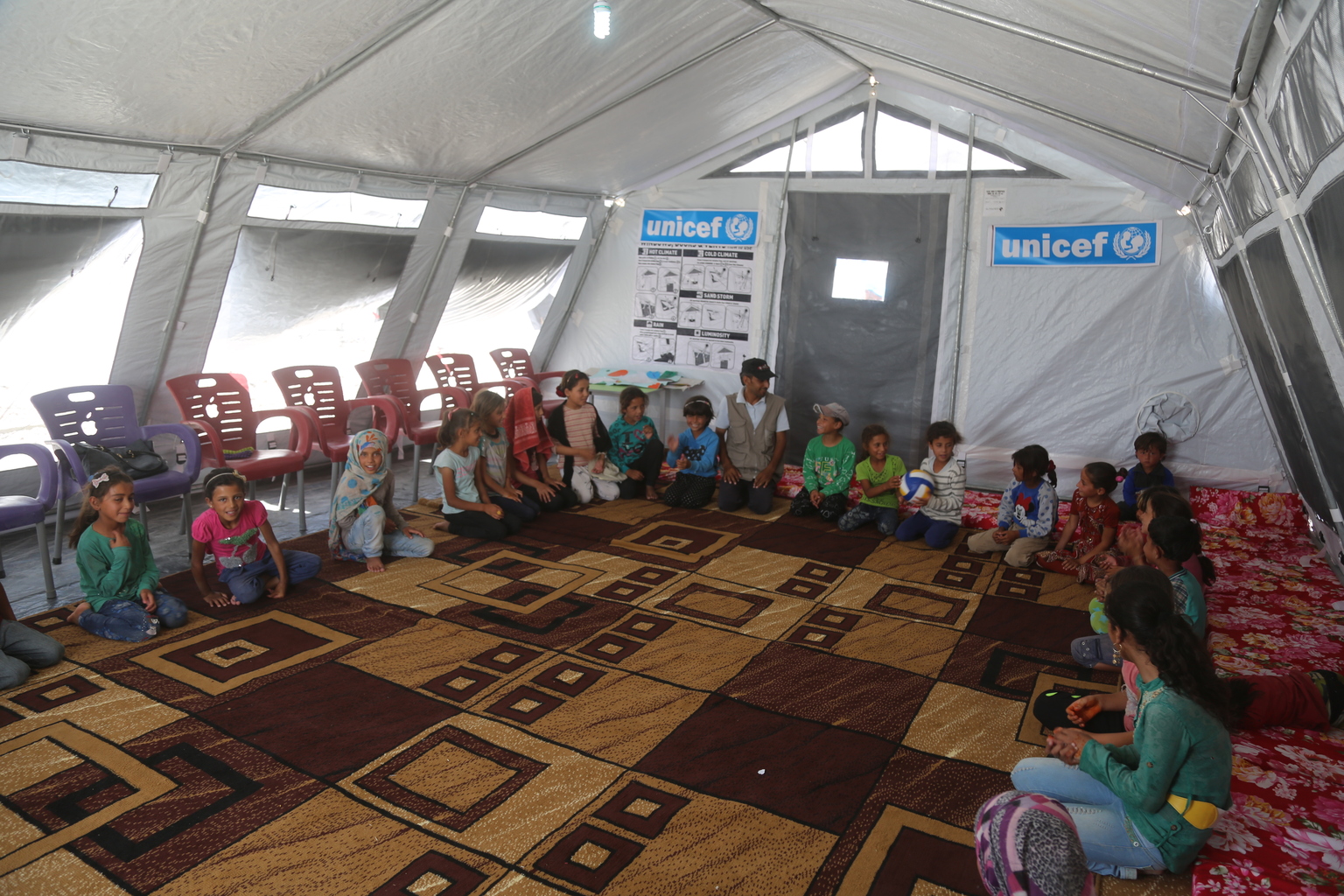Children displaced from Raqqa find respite from fear and stress
2017-08-01
© UNICEF/UN070713/Souleiman
A displaced boy from Raqqa carries jerrycans to collect water in Ain Issa displacement camp.
As heavy fighting rages in Raqqa, more than 200,000 people, half of them children, have been forced to flee their homes.
They risk everything to reach safety. Many travel on roads full of landmines, or dodge shelling and snipers. One of their destinations is Ain Issa, 50 kilometres from the front lines in Raqqa city.
The Ain Issa camp sits on a dusty expanse of desert in north eastern Raqqa Governorate. It is hard to imagine a harsher environment. Scorching 45-degree centigrade heat and swirling sands make life unbearable for the nearly 3,000 children temporarily making their homes here.
After travelling for weeks with little food and water, children arrive exhausted and dehydrated. The traumatic experiences they lived through are plain to see in their faces and in their behaviour. Their stories are horrifying. Mothers and children tell of seeing their loved ones killed. Others worry about the safety and well-being of family members left behind.
Forced to grow up too soon

©UNICEF/UN070718/Souleiman
Displaced children from Raqqa leave a UNICEF child-friendly space in Ain Issa displacement camp.
The dangerous journey out of Raqqa city can take weeks. Some families pay smugglers to guide them along safe roads, avoiding the landmines that pervade many routes out of the city.
“We left at five in the morning,” says Hammoude, 10, recalling his family’s journey. “We were scared, but we got here in the end.” Hammoude and his family arrived in Ain Issa camp three weeks ago.
“I was at school, but I was forced out,” he says. “They set up cameras; whenever someone entered [the school], they would shoot them.” His eyes are full of fear as he recalls his ordeal.
Almost every child I met in the UNICEF tent shared harrowing stories of their struggle to survive in Raqqa amidst the constant threat of death, injury, or separation from their loved ones. Listening to them talk about the violence and trauma they endured, it is clear that these children have been forced to grow up too soon.
Dua’a, 8, fled Raqqa with her family when their house was destroyed in the fighting. One of Dua’a’s others also went missing. “They took my other. He’s older. They took him, and even today we don’t know where he is. He loved me; I used to play with him all the time,” Dua’a recalls. “But now we don’t know anything about him.”
The children I saw in the camp look terrified, the fear and uncertainty evident in their eyes.
Making life a little more bearable for children
Hammoude and Dua’a come to 1 of the 6 UNICEF-supported child-friendly spaces in Ain Issa camp, where they play traditional games, and draw and sing under the guidance of 2 trained facilitators.
“We love Miss Bushra,” says Dua’a, referring to one of the facilitators. “When we lived in Raqqa, nothing was allowed. The [school] principal used to make us dress in black. It’s good here; they give us clothes and toys. They give us everything. And teach us how to do things,” she adds with a smile.

©UNICEF/UN070715/Souleiman
In Ain Issa camp in the Syrian Arab Republic, displaced children from Raqqa attend a UNICEF psychosocial support programme.
The child-friendly spaces give children a chance to be children again. They also offer psychosocial activities to help them cope with the trauma they have faced, while recreational and educational kits enable them to resume their learning.
Despite what they saw and experienced in Raqqa, all the children I met said they want to go to school. Education is a priority for their parents as well. “We need a place for our children to play,” says one mother who did not know about the new child-friendly space. “We also need a school.”
The fear and loss I saw in the eyes of Hammoude, Dua’a and many other children in Ain Issa was hearteaking. But hearing their laughter and their voices, watching them play and sing, I had a sense that there is also hope, and a future for these children.









